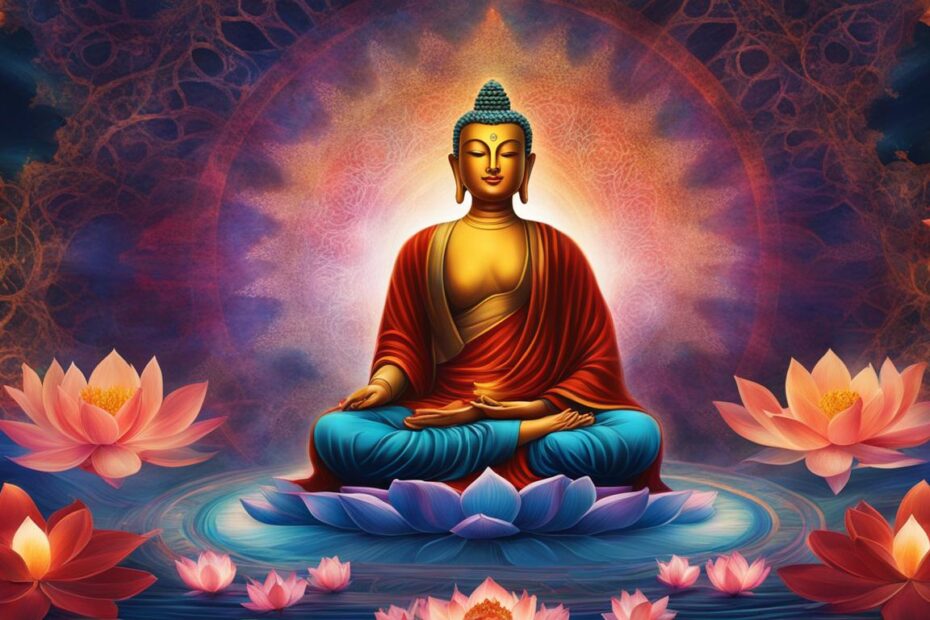Prayer in Buddhism is a practice that goes beyond seeking blessings or favors from a higher power. It is a means of invoking enlightened qualities, cultivating compassion, and deepening our spiritual connection. Buddhist prayer is intertwined with meditation practices and serves as a powerful tool for personal growth and awakening.
Key Takeaways:
- Prayer in Buddhism is a way to invoke enlightened qualities and cultivate compassion.
- Buddhist prayer is a practice that combines with meditation to deepen spiritual connection.
- Praying can enhance understanding of the self and guide one on the path to liberation.
- It is a practice of surrender, trust, and embracing all circumstances with humility and gratitude.
- Buddhist prayer is not focused on seeking favors or blessings but on personal growth and awakening.
The Origins of Prayer in Human Society
Prayer, as a ritual practice, has a long and rich history that can be traced back to ancient human societies. It emerged as a way for individuals and communities to connect with and seek the favor of powerful deities believed to have control over various aspects of life. In these early societies, prayer was an essential tool for navigating the uncertainties and dangers of the natural world.
The worship of deities and the belief in their power to influence human affairs led to the development of formal religious rites and traditions. As human societies transitioned from hunter-gatherer lifestyles to agrarian cultures, prayer became ingrained in the fabric of daily life. It played a vital role in seeking protection from wild beasts, ensuring bountiful harvests, and warding off illnesses. Prayer provided a sense of comfort and security in the face of the unknown.
This practice of prayer also varied across different ancient societies, each with their unique rituals and beliefs. For example, the Egyptians had complex prayer rituals that involved offerings and specific gestures. The ancient Greeks would often pray to a pantheon of gods, seeking their guidance and favor. In India, prayer was integrated into the Vedic rituals of the early Aryan civilization.
| Ancient Society | Features |
|---|---|
| Egyptians | Complex prayer rituals involving offerings and gestures |
| Greeks | Prayer directed towards a pantheon of gods for guidance and favor |
| India (early Aryan civilization) | Prayer integrated into Vedic rituals |
“Prayer, as an ancient practice, emerged as a way for humans to connect with powerful deities and seek protection in the face of the uncertainties and dangers of the natural world.”
Overall, the origins of prayer in human society can be attributed to the innate desire of individuals to seek connection, guidance, and protection from the divine. As civilizations developed and religious practices evolved, prayer became a central aspect of human culture, shaping the spiritual traditions that continue to be celebrated and practiced today.
Theistic and Non-theistic Traditions: Understanding Prayer in Buddhism
In the realm of prayer, Buddhism stands apart from other religious traditions due to its non-theistic nature. While theistic traditions often direct prayers towards an all-knowing deity, Buddhism views prayer as a means of invoking enlightened qualities and cultivating compassion within oneself. This fundamental difference in approach reflects the core principles and teachings of Buddhism.
Non-theistic traditions, such as Buddhism, emphasize the power and potential of individual practitioners to awaken their own inner wisdom and compassion. Rather than relying on an external divine being, prayer in Buddhism is a practice that fosters self-reflection, mindfulness, and the cultivation of positive qualities. It is a tool that helps individuals connect with the inherent enlightened nature within themselves.
“In Buddhism, prayer is not so much about seeking external blessings, but rather about uncovering the innate compassion and wisdom that resides within each of us.”
Through prayer, Buddhists direct their intentions and aspirations towards buddhas, bodhisattvas, and spiritual masters as symbols of the enlightened qualities they seek to cultivate. This act of devotion and reverence serves as a reminder and inspiration for practitioners to embody these qualities in their own lives. It is a practice that encourages mindful reflection, selflessness, and a deepening understanding of the interconnectedness of all beings.
Theistic versus Non-theistic: A Comparative Overview
To further illustrate the contrasting nature of prayer in theistic and non-theistic traditions, the table below presents a comparison of key characteristics:
| Theistic Traditions | Non-theistic Traditions (Buddhism) |
|---|---|
| Direct prayers towards an all-knowing deity or deities | View prayer as a means of invoking enlightened qualities |
| Seek salvation or blessings from an external source | Foster self-reflection and the cultivation of positive qualities |
| Emphasize divine intervention and guidance | Focus on personal effort and inner transformation |
| Place trust in the will of a higher power | Encourage self-reliance and the cultivation of wisdom and compassion |
Understanding these distinctions sheds light on the unique role and significance of prayer in Buddhism. While theistic traditions find solace and guidance in the presence of an all-knowing deity, non-theistic traditions like Buddhism emphasize the transformative potential within each individual. Prayer in Buddhism becomes a practice of self-discovery, an avenue to awaken the inherent qualities of compassion and wisdom that reside within.
Invocation through Buddhist Prayer
In Buddhism, prayer serves as a way to connect with the sacred and invoke enlightened qualities. Buddhists often direct their prayers towards buddhas, bodhisattvas, and spiritual masters, seeking guidance and inspiration on their spiritual journey. By engaging in prayer, practitioners aim to awaken and cultivate compassion, wisdom, and other enlightened qualities within themselves.
Praying to specific buddhas and bodhisattvas is believed to invoke their unique attributes and qualities. For example, praying to Tara, a female buddha in tantric Buddhism, can help practitioners cultivate compassion towards all beings. Tara is known for her swift and compassionate response to the suffering of the world. Similarly, praying to Avalokiteshvara, the Buddha of Compassion, can help practitioners transcend limitations and biases, and hold all beings with kindness and care.
“Prayer is not asking. It is a longing of the soul. It is daily admission of one’s weakness. It is better in prayer to have a heart without words, than words without a heart.” – Mahatma Gandhi
Buddhist prayer is not about seeking external intervention but rather an inner transformation. It is a practice of turning inward, connecting with the inherent qualities of wisdom and compassion that already exist within oneself. Through prayer, Buddhists cultivate a deep sense of reverence and gratitude for the path and teachings that lead to awakening.

The Power of Buddhist Prayer
Buddhist prayer has the power to transform the practitioner’s mind and heart. It serves as a spiritual practice that deepens one’s commitment to the Buddhist path and fosters a profound sense of connection to the divine. Through the act of prayer, Buddhists surrender their personal desires and ego-centric tendencies, aligning themselves with the greater will and wisdom of existence.
By invoking enlightened qualities through prayer, Buddhists cultivate a compassionate response to the world and find the strength and insight to navigate the challenges of life. Prayer becomes a source of courage, wisdom, and unconditional wakefulness, enabling practitioners to embrace all circumstances with trust and surrender to the mysterious forces that shape the universe.
The Power of Devotional Practices in Tantric Buddhism
Tantric Buddhism encompasses a rich array of devotional practices that deepen spiritual connection and inspire profound experiences of awakening. These practices include visualization, chanting, and acts of devotion that engage the senses and cultivate a sense of reverence. Through these practices, practitioners tap into the transformative power of the mind, connecting with enlightened qualities and expanding their spiritual horizons.
Visualization is a key aspect of devotional practices in tantric Buddhism. It involves mentally imagining sacred forms of lineage masters, buddhas, and bodhisattvas. By vividly visualizing these enlightened beings, practitioners establish a direct and intimate connection with their enlightened qualities. This visualization practice serves as a vehicle for purifying the mind, overcoming mental obstacles, and opening oneself to the limitless potential of enlightenment.
Visualization practice in tantric Buddhism is like painting a picture in the mind, allowing practitioners to immerse themselves in the vast realm of the awakened mind and develop a deep sense of connection and devotion.
Chanting is another powerful devotional practice that is widely embraced in tantric Buddhism. Through the recitation of sacred mantras and prayers, practitioners invoke the blessings and protection of buddhas and bodhisattvas. The rhythmic repetition of these sacred sounds creates a meditative state, purifies the mind, and harmonizes the practitioner’s energy with the enlightened qualities of the chosen deity. Chanting acts as a transformative tool, allowing practitioners to align their intentions and aspirations with the enlightened forces of the universe.
Devotional acts of offering and prostration are also common in tantric Buddhism. These acts symbolize humility, surrender, and the recognition of the divine qualities within oneself and others. By making offerings or prostrating before sacred images, practitioners express their reverence and gratitude, deepening their connection to the spiritual path and cultivating a compassionate attitude towards all beings.
Table: Comparing Visualization and Chanting in Tantric Buddhism
| Visualization | Chanting |
|---|---|
| Engages the mind through imagery | Engages the voice through recitation |
| Creates a visual connection with buddhas and bodhisattvas | Invokes the presence and blessings of enlightened beings |
| Purifies the mind and overcomes mental obstacles | Harmonizes energy and aligns intentions with enlightened forces |
| Offers an immersive experience in the awakened realm | Creates a meditative state and cultivates mindfulness |
Devotional practices in tantric Buddhism are not limited to rituals but are understood as transformative means to deepen spiritual connection, purify the mind, and awaken enlightened qualities within oneself. They offer practitioners a holistic approach to spiritual growth and serve as powerful tools on the path to liberation.
Prayer as a Source of Courage and Insight
In times of hardship and despair, prayer can serve as a powerful source of courage and insight. When faced with challenging situations, many individuals naturally turn to prayer to find strength and clarity. It is during these tough times that prayer becomes an active means of engaging with life’s struggles and cultivating a compassionate response to the world.
Prayer provides a space for individuals to connect with their innermost selves and seek guidance from a higher power. It allows us to let go of our worries and fears, and instead, focus on developing a deeper understanding of ourselves and the situations we face. Through prayer, we tap into a wellspring of inner strength and wisdom that helps us navigate through difficult moments with grace and resilience.
Moreover, prayer offers a profound sense of solace and comfort, knowing that we are not alone in our struggles. It enables us to find courage in the face of adversity and provides a renewed perspective on life’s challenges. Prayer has the power to shift our mindset, offering insights and revelations that might otherwise elude us, allowing us to see the world with fresh eyes and find meaning in the midst of difficulty.

The Power of Prayer: Quotes for Inspiration
“Prayer is not asking. It is a longing of the soul. It is daily admission of one’s weakness. It is better in prayer to have a heart without words than words without a heart.” – Mahatma Gandhi
“Prayer does not change God, but it changes him who prays.” – Soren Kierkegaard
“Prayer is not an old woman’s idle amusement. Properly understood and applied, it is the most potent instrument of action.” – Mahatma Gandhi
Table: The Transformative Power of Prayer
| Benefits of Prayer | Impact on Individuals |
|---|---|
| Source of Courage | Provides strength and resilience during tough times. |
| Source of Insight | Enhances clarity of thought and deepens understanding. |
| Comfort and Solace | Offers a sense of peace and support during difficult moments. |
| Shift in Perspective | Brings new insights and revelations, fostering personal growth. |
| Connection to Higher Power | Strengthens the bond with a greater spiritual source. |
The Power of Prayer in Times of Global Challenges
As the world faces unprecedented challenges such as climate change, pandemic, and political division, the power of prayer can provide solace, hope, and healing. Prayer is a deeply personal and spiritual practice that allows individuals to connect with a higher power and seek guidance, comfort, and strength in difficult times. It serves as a reminder of our interconnectedness and the importance of compassion and unity in the face of adversity.
In times of environmental crisis, prayer can be a powerful tool for raising awareness and inspiring positive action. By acknowledging the impact of our actions on the planet and seeking guidance through prayer, we can cultivate a deep sense of reverence and responsibility for the natural world. Prayer also offers a space for reflection, where we can contemplate our role in addressing climate change and find the motivation to make meaningful changes in our lives.
During a global pandemic, prayer can provide comfort, healing, and resilience. It allows individuals to express their fears, hopes, and desires to a higher power, finding solace in the knowledge that they are not alone in their struggles. Prayer can also foster a sense of community and solidarity, as people come together in collective prayer for the well-being of all those affected by the pandemic. It is a reminder that we are interconnected and that our actions and intentions can have a profound impact on the world around us.

In times of political division, prayer can serve as a catalyst for healing, understanding, and reconciliation. It provides a space for individuals to set aside their differences and come together in prayer for peace, unity, and justice. Prayer can help cultivate empathy and compassion, allowing individuals to see beyond their own perspectives and embrace the humanity in others. It is a powerful tool for transforming conflict and fostering dialogue, creating a path towards harmony and mutual respect.
As the world continues to grapple with these global challenges, prayer remains a source of strength, guidance, and hope. It offers a means of finding peace amidst chaos, healing amidst suffering, and unity amidst division. Through prayer, individuals can tap into their own inner resources and connect with a higher power, drawing upon a wellspring of resilience, compassion, and wisdom. It is a practice that transcends boundaries and reminds us of our shared humanity, reminding us that together, we can navigate these challenges and create a better world for all.
Prayer and Surrender to the Mysterious Forces of Existence
Prayer can be seen as a profound act of surrender to the mysterious forces that govern our existence. It is an acknowledgment of our connection to a greater reality beyond our limited sense of self. Through prayer, we embrace all circumstances, trusting in a benevolent outside force that transcends our individual desires and concepts of goodness.
By revering these mysterious forces through prayer, we develop a deeper sense of humility and awe for the wonders of the universe. We recognize that there is a greater will at play, one that is beyond our comprehension. Surrendering to this higher power allows us to let go of control and find solace in the belief that there is a greater plan unfolding, even amidst the challenges and uncertainties of life.

“Prayer is not asking. It is a longing of the soul. It is daily admission of one’s weakness. It is better in prayer to have a heart without words than words without a heart.” – Mahatma Gandhi
Connecting to a Greater Will
Through prayer, we establish a profound connection to a greater will that permeates all aspects of our existence. It is a way of aligning ourselves with the natural flow of life and surrendering our individual desires to a higher purpose. Prayer invites us to trust in the unknown, to have faith in the unseen, and to find solace in the belief that there is a greater force guiding us on our journey.
By connecting to this greater will through prayer, we cultivate a sense of reverence and gratitude for the interconnectedness of all beings. We recognize that we are not separate from the world around us, but an integral part of a vast cosmic tapestry. Through surrender and reverence, we open ourselves to the wisdom and guidance that flows from this greater will, allowing it to illuminate our path and lead us towards a more meaningful and purposeful existence.
| Benefits of Prayer and Surrender | Connecting to a Higher Power |
|---|---|
| Fosters a sense of humility and openness | Deepens our connection to the divine |
| Allows for the acceptance of all circumstances | Guides us towards a higher purpose |
| Instills a sense of trust in the unknown | Aligns us with the natural flow of life |
Prayer and surrender to the mysterious forces of existence provide us with a pathway to transcend our limited perspective and tap into the infinite wisdom of the universe. It is an invitation to embrace all circumstances with reverence, to trust in the unseen, and to surrender our individual desires to a greater will. Through this practice, we can find solace, guidance, and a deeper sense of connection to the profound mysteries that shape our lives.
Prayer as a Path to Awakening Compassion and Wisdom
Prayer, in the context of Buddhism, is not merely a request for blessings or favors from a higher power. Instead, it serves as a profound practice to connect with compassion and wisdom within ourselves. When we engage in prayer, we turn our hearts and minds toward positive qualities, cultivating empathy and embracing the interconnectedness of all beings. Through prayer, we can deepen our understanding of the self and cultivate a sense of boundless compassion.
By directing our prayers towards enlightened beings such as buddhas, bodhisattvas, and spiritual masters, we invoke their enlightened qualities within ourselves. For example, praying to Tara, the female buddha known for her compassion, can help us awaken compassion towards the whole world. Similarly, praying to Avalokiteshvara, the embodiment of compassion, can help us transcend our limitations and biases, holding everyone with kindness and care.
Prayer also serves as a means of self-reflection and self-transformation. As we engage in prayer, we become more aware of our own thoughts, emotions, and intentions. Prayer helps us cultivate mindfulness and develop a deeper understanding of the workings of our mind. It encourages us to examine our own thoughts and actions, bringing about personal growth and transformation.
Through prayer, we are reminded of our interconnectedness and interdependence with all beings. We recognize that our individual well-being is intimately connected to the well-being of others. Prayer awakens our innate sense of compassion and motivates us to act for the benefit of all. It is a practice that not only deepens our spiritual connection but also encourages us to engage actively in the world, embodying the values of compassion, wisdom, and loving-kindness.

The Power of Prayer in Buddhism
| Benefits of Prayer in Buddhism | Explanation |
|---|---|
| Awakening Compassion | Prayer helps us connect with the compassionate qualities of enlightened beings, awakening our own innate sense of compassion. |
| Self-Reflection and Transformation | Engaging in prayer allows us to observe and reflect on our own thoughts, emotions, and intentions, leading to personal growth and transformation. |
| Recognizing Interconnectedness | Prayer reminds us of our interconnectedness with all beings, motivating us to act for the benefit of others and the world. |
“Prayer is not asking. It is a longing of the soul. It is daily admission of one’s weakness. It is better in prayer to have a heart without words than words without a heart.” – Mahatma Gandhi
Praying for Deep Unconditional Wakefulness
Prayer in Buddhism goes beyond seeking personal desires and blessings. It can be a powerful practice for awakening to a deep unconditional wakefulness. By praying, we open ourselves to a greater reality that transcends our individual ego and desires. It is a practice of surrender and trust, embracing all circumstances with the belief that grace is present in every moment.
In prayer, we align ourselves with the truth of the present moment and let go of attachments to specific outcomes. It is an act of faith in a reality that we may not fully understand but trust to be benevolent and wise. Through prayer, we expand our awareness and connect with the innate wisdom that guides all existence.
Embracing All Circumstances with Trust in a Greater Reality
Prayer allows us to embrace all circumstances without judgment or resistance. It is an invitation to surrender and let go of the need for control. By trusting in a greater reality, we find peace and contentment in the midst of challenges and uncertainties. Prayer helps us shift our perspective from self-centered desires to a deep appreciation for the interconnectedness of all beings.
“In prayer, we let go of our ego’s desires and preferences, and surrender to the mysterious forces that order the world.”
Through prayer, we cultivate an attitude of acceptance and gratitude, recognizing that every experience holds the potential for growth and transformation. It is a practice that nourishes our spiritual journey and helps us align our actions with compassion, wisdom, and the highest good for all.
| Benefits of Praying for Deep Unconditional Wakefulness | How Prayer Supports Awakening |
|---|---|
| 1. Cultivates humility and surrender | 1. Connects us to a greater reality |
| 2. Deepens trust in the mystery of existence | 2. Enhances awareness and mindfulness |
| 3. Fosters a sense of interconnectedness | 3. Aligns us with the truth of the present moment |
| 4. Helps overcome attachment and desires | 4. Expands our capacity for compassion |
Praying for deep unconditional wakefulness is an invitation to merge our individual consciousness with the universal consciousness. It is a practice that allows us to transcend the limitations of our ego and connect with the boundless love and wisdom that exist within and around us.
Prayer and Embracing the Concept of Emptiness
In Buddhism, prayer goes beyond seeking specific outcomes or blessings. It is a practice that allows individuals to embrace the concept of emptiness and connect with a higher power or reality that transcends fixed concepts and separate forms. Prayer in Buddhism is not a form of nothingness but rather a recognition of the interconnectedness of all life and the underlying unity that exists beneath the surface of appearances.
When we engage in prayer, we surrender to the unknown and trust in the innate wisdom of existence. It is an opportunity to let go of our individual desires and preferences, aligning ourselves with the greater will that permeates the universe. By surrendering to this higher power, we open ourselves up to new possibilities and invite a deeper understanding of ourselves and the world around us.
“Through prayer, we connect with a reality that underlies all forms and connects all life. It is an act of reverence and surrender, reminding us that we are part of something greater than ourselves.” – Buddhist Master
Prayer provides a space for us to release our attachment to control and to find solace in the mysterious forces that order the world. It allows us to navigate the uncertainties of life with trust and faith, knowing that there is a greater plan at play. Through prayer, we cultivate humility and an acceptance of all circumstances, finding contentment in the present moment and transcending our self-centered desires.
By embracing the concept of emptiness in prayer, we can deepen our spiritual connection and align ourselves with the truth that lies beyond our limited understanding. It is a practice that invites us to surrender our ego’s need for certainty and to embrace the vastness of existence. Through prayer, we can find solace, guidance, and a sense of oneness with the higher power that resides within and around us.
Praying for Contentment and Transcending Self-Clinging
Prayer in Buddhism offers a path to finding contentment by transcending self-centered desires and attachments. It is through the practice of prayer that we can let go of our ego’s relentless pursuit of satisfaction and learn to embrace the present moment with gratitude and acceptance.
By praying for contentment, we acknowledge the impermanence and unsatisfactory nature of attachment to desires. We recognize that true happiness lies not in the fulfillment of every craving, but in cultivating an awareness that goes beyond our individual wants and needs. Through prayer, we can gain insight into the nature of suffering and develop a deeper understanding of the transient nature of our desires.
Prayer serves as a reminder that the pursuit of external sources of happiness is ultimately futile. It guides us towards a state of inner contentment that is not dependent on external circumstances. By surrendering our self-centered desires and embracing the present moment, we open ourselves to a profound sense of peace and fulfillment.
The Power of Prayer for Contentment
“Prayer is the key to finding contentment in the midst of life’s challenges and uncertainties. Through prayer, we can let go of our clinging to desires and attachments, and find peace in the present moment.” – Buddhist Teaching
Through prayer, we shift our focus from external desires to an inner state of contentment. It is a practice that reminds us to embrace the imperfections of life and find fulfillment in the present moment. By transcending self-centered desires, we cultivate a deeper understanding of ourselves and the world around us, leading to a more meaningful and fulfilling life.
Prayer for contentment is not about suppressing our desires or denying the difficulties we may face. Instead, it is a practice of acknowledging our desires, understanding their impermanence, and finding peace in the midst of life’s challenges. Through prayer, we can let go of the constant pursuit of external validation and instead find solace in our connection to something greater than ourselves.
Table: Comparing Self-Centered Desires and Contentment
| Self-Centered Desires | Contentment |
|---|---|
| Dependent on external circumstances | Inner state of peace and fulfillment |
| Pursuit of material possessions | Embracing the present moment |
| Never-ending cycle of desires | Acknowledging the impermanence of desires |
| Temporary gratification | Lasting inner contentment |
Through the practice of prayer, we can break free from the cycle of self-centered desires and awaken to a deep sense of contentment. It is a transformative journey towards embracing the present moment, finding peace within ourselves, and cultivating a profound connection to the world around us.
The Practice of Trust and Surrender in Prayer
Prayer in Buddhism is a practice that encompasses trust in a higher power or reality beyond our understanding. It is a way of surrendering control and embracing the unknown. Through prayer, we cultivate a sense of humility and openness, allowing life to unfold in its own way while remaining connected to our deepest values and ideals.
Letting go of control is an essential aspect of prayer. It is an acknowledgment that we cannot control every outcome and that there is a greater plan at play. By surrendering to a higher power, we free ourselves from the burden of trying to manipulate and force things to align with our desires. This surrender allows us to find peace and acceptance in all circumstances, whether they are favorable or challenging.
“Prayer is not asking. It is a longing of the soul. It is daily admission of one’s weakness. It is better in prayer to have a heart without words than words without a heart.” – Mahatma Gandhi
Trusting in prayer also means trusting in ourselves. Through prayer, we tap into our inner wisdom and connect with the compassionate qualities that reside within us. It is a practice that guides us towards awakening our own innate goodness and aligning our actions with the greater good. We trust that by cultivating kindness and compassion through prayer, we contribute to the well-being of all beings.
The Power of Trust and Surrender in Prayer
When we trust in prayer and surrender to a higher power, we create space for miracles and grace to enter our lives. We let go of the need to control every aspect of our existence and instead embrace the flow of life. Trust and surrender in prayer allow us to find peace, comfort, and guidance in times of uncertainty and challenges. It is an invitation to let go of our fears and anxieties and place our trust in a power greater than ourselves.
Through the practice of trust and surrender in prayer, we open ourselves up to the possibilities that exist beyond our limited understanding. It is an act of faith in the interconnectedness of all things and a recognition that we are part of a larger tapestry of existence. By trusting in prayer, we invite the unseen forces of the universe to guide us on our journey and illuminate our path with wisdom and love.
| Benefits of Trust and Surrender in Prayer | Examples |
|---|---|
| Inner Peace | Prayer helps to calm the mind and cultivate inner peace, reducing stress and anxiety. |
| Emotional Healing | Through prayer, we can release emotional burdens and find healing and solace. |
| Strength and Resilience | Prayer provides us with the strength and resilience to overcome challenges and face adversity with courage. |
| Guidance and Direction | Trusting in prayer opens us up to receive guidance and direction in our lives, helping us make wiser choices. |
| Connection to the Divine | Through surrendering in prayer, we deepen our connection to the divine and experience a sense of oneness with all that is. |
Embracing All Circumstances with Belief in God
Prayer in Buddhism involves embracing all circumstances with the belief that God or a higher power is the true way of the world. It is an acknowledgment that our limited perspective may not fully grasp the workings of the universe, but we trust that goodness and grace exist regardless. Praying deepens our connection to the divine and fosters an attitude of acceptance and surrender.
“Prayer is not asking. It is a longing of the soul. It is daily admission of one’s weakness. It is better in prayer to have a heart without words than words without a heart.” – Mahatma Gandhi
Through prayer, Buddhists surrender to a greater plan, recognizing that there is a wisdom beyond their understanding. It is a practice of trust, letting go of control, and aligning oneself with the divine will. By embracing all circumstances, whether they are joyful or challenging, Buddhists cultivate an attitude of gratitude and humility.
The Power of Surrender
Surrendering to a greater plan through prayer allows Buddhists to let go of attachment to outcomes and surrender their own will. It is a release of the ego’s desires and an opening to something beyond individual preferences. This surrender is both an act of faith and an acknowledgment of the interconnectedness of all beings and the greater wisdom that pervades the universe.
Belief in God as the true way helps Buddhists navigate the complexities of life with a sense of acceptance and trust. It provides solace during times of uncertainty and allows for a deepening of spiritual connection. Through prayer, Buddhists find comfort in surrendering to a power greater than themselves and embracing the path laid before them.
Table: Surrender and Embracing All Circumstances
| Benefits of Surrender and Embracing All Circumstances | Explanation |
|---|---|
| Acceptance | By surrendering to a greater plan, Buddhists cultivate acceptance of all circumstances, finding peace in the face of challenges. |
| Humility | Surrendering to a higher power fosters humility and a recognition of our own limitations, allowing for personal growth and transformation. |
| Trust | Belief in God as the true way engenders trust in the inherent wisdom and goodness of the universe, guiding Buddhists through life’s ups and downs. |
| Connection | Prayer and surrender deepen the spiritual connection to a higher power, fostering a sense of interconnectedness with all beings. |
The Power of Prayer in Combining Buddhist Practice and Devotion
In Buddhism, prayer is not just a mere act of supplication; it is a powerful tool that can deepen our spiritual connection and enhance our Buddhist practice. By combining mindfulness with prayer, practitioners can access a profound level of devotion and open themselves to the enlightened qualities of compassion and wisdom. This section explores the significance of prayer in Buddhism and how it can fuel our spiritual journey.
When we practice mindfulness, we cultivate a state of present moment awareness, observing our thoughts, feelings, and sensations with non-judgmental attention. Mindfulness allows us to develop clarity and insight into the nature of reality. By incorporating prayer into this practice, we can direct our focus towards invoking enlightened qualities within ourselves and connecting with the divine.
Buddhist prayer provides a unique opportunity to engage with the spirituality of the Dharma. It acts as a bridge between our individual selves and the larger universal consciousness. Through prayer, we can express gratitude, seek guidance, and invoke the blessings of buddhas, bodhisattvas, and spiritual masters. This deepens our sense of connection and fosters a profound spiritual experience.
Conclusion
In conclusion, prayer holds a significant role in the practice of Buddhism, serving as a powerful tool for invoking enlightened qualities and cultivating compassion. Unlike prayer in theistic traditions, Buddhist prayer is a means of connecting with the inner wisdom and compassion within oneself. Through prayer, practitioners can transcend limitations and biases, embrace all beings with kindness and care, and deepen their understanding of the self.
Prayer also serves as a source of courage and insight, providing individuals with strength and clarity during tough times. It is an active means of engaging with life’s struggles and cultivating a compassionate response to the world. Moreover, in the face of global challenges such as climate change, pandemics, and political division, prayer can offer solace, healing, and harmony, allowing individuals to pray for the well-being of all beings and find peace within.
By surrendering to the mysterious forces of existence and embracing the concept of emptiness, prayer in Buddhism allows individuals to connect with a greater reality beyond their limited sense of self. It fosters trust, surrender, and a belief in a benevolent outside force that transcends individual desires and concepts of goodness. Through prayer, practitioners can awaken compassion, deepen their spiritual connections, and walk the path towards liberation and enlightenment.
FAQ
What is the origin of prayer in human society?
Prayer originated in early human societies as a way to worship deities and seek protection from dangers such as wild beasts and illness.
What is the difference between prayer in theistic and non-theistic traditions?
In theistic traditions, prayer is often directed towards an omnipotent being such as God, while in non-theistic traditions like Buddhism, prayer is a means to invoke enlightened qualities and cultivate compassion within oneself.
Who do Buddhists pray to?
Buddhists often direct their prayers towards buddhas, bodhisattvas, and spiritual masters to invoke the enlightened qualities of their own heart and mind.
What are devotional practices in tantric Buddhism?
Devotional practices in tantric Buddhism involve visualizing sacred forms of lineage masters and chanting poetic prayers to them, creating a sense of connection and inspiration.
How can prayer serve as a source of courage and insight?
Prayer can provide individuals with strength and clarity during challenging times and help them find courage and insight to navigate difficult situations.
How can prayer be powerful in times of global challenges?
Prayer can serve as a tool for finding peace, healing, and harmony in the face of global challenges such as climate change, pandemics, and political division.
What does prayer involve in surrendering to mysterious forces of existence?
Prayer is an act of acknowledging our connection to a greater reality and surrendering to the unknown and trusting in a benevolent outside force that transcends our individual desires and concepts of goodness.
How can prayer deepen our understanding of the self and cultivate compassion?
Prayer is a means of turning our hearts and minds towards positive qualities, fostering empathy, and embracing the interconnectedness of all beings, thus deepening our understanding of the self and cultivating boundless compassion.
What does prayer help us surrender to in Buddhism?
Prayer in Buddhism helps us surrender to a higher power or reality that underlies all forms and connects all life, embracing the concept of emptiness and trusting in the innate wisdom of existence.
How can prayer be a means of seeking contentment and transcending self-clinging?
Prayer can help us let go of self-centered desires and attachments, embracing the present moment and cultivating an awareness that goes beyond the endless cycle of wants and desires.
What does prayer require?
Prayer requires trust and surrender to a higher power or reality, acknowledging our limits and letting go of control while remaining connected to our deepest values and ideals.
How does prayer enhance and deepen Buddhist practice?
Prayer combined with mindfulness and devotion can create a profound spiritual connection, deepening our understanding of the self, and reinforcing our commitment to the Buddhist path.








